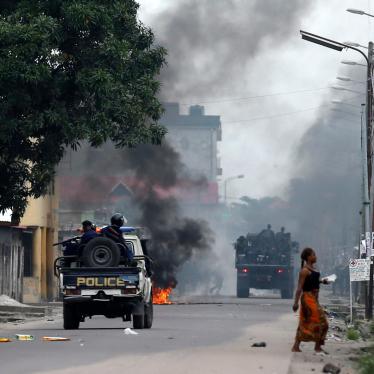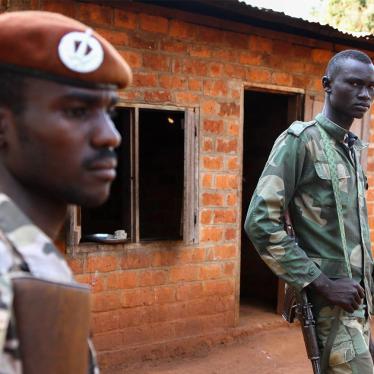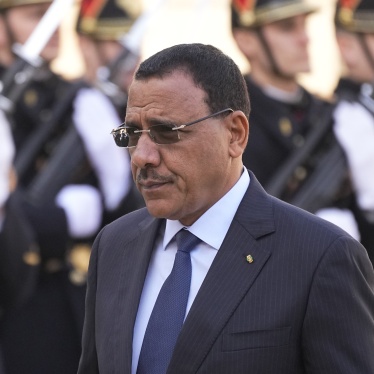(Washington, DC) – The Sudanese government should investigate the discovery of a cluster bomb in Southern Kordofan, a conflict zone hit by government bombing, Human Rights Watch said today. Human Rights Watch called on Sudan to join the international treaty banning the weapon.
“Sudan claims it doesn’t possess cluster bombs, so why have cluster munitions been found on its territory?” said Steve Goose, Arms Division director at Human Rights Watch. “Cluster bombs cause unnecessary and unjustified risk and harm to civilians. We believe they should not be used by armed forces, anywhere, any time.”
The government of Sudan should investigate and explain this incident, as well as previous allegations of use of cluster munitions, Human Rights Watch said.
Since June 2011, the Sudan Armed Forces (SAF) has been fighting the Sudan People’s Liberation Army North (SPLA-N) in Southern Kordofan and Blue Nile states. Earlier, in May 2012, Human Rights Watch reported that Sudanese government forces were conducting indiscriminate bombings and abuses against civilians in Southern Kordofan. Southern Kordofan and Blue Nile states border South Sudan, which gained independence in July 2011. Communities in both states were aligned with the southern rebels during Sudan’s 22-year civil war.
On May 24, The Independent newspaper in the United Kingdom published photos of a failed cluster munition in the settlement of Ongolo in Southern Kordofan. Residents said that it had been dropped from a government aircraft on April 15. The weapon is a Soviet-made RBK-500 cluster bomb containing AO-2.5 RT submunitions (individual bomblets), Human Rights Watch said.
Human Rights Watch said that photographs showed that the cluster bomb had failed to function as designed, and that apparently none of the bomblets exploded. Human Rights Watch said it is not in a position to determine definitively that the Sudanese air force deliberately used the weapon in an attack, or when the cluster bomb had been deployed. Opposition forces do not have combat aircraft.
In a separate incident, on March 1, a journalist photographed explosive submunitions in the town of Troji in Southern Kordofan that Human Rights Watch has identified as Chinese Type-81 DPICM, or dual purpose improved conventional munitions. Local residents told the journalist that the government of Sudan attacked Troji with cluster munitions on February 29, one day after the SPLM-N took control of the town. They also said that two teenage boys were reported killed when one picked up a submunition by its orange-colored ribbon.
Seventy-one countries are party to the 2008 Convention on Cluster Munitions, which prohibits the use of cluster munitions. Another 40 have signed but not yet ratified the convention. At a meeting of the Convention on Cluster Munitions on April 19, a Sudan government representative rejected allegations that the government has used cluster munitions in Southern Kordofan and blamed the SPLM-N.
Sudan participated in the cluster munition treaty negotiations and joined the consensus adoption of the Convention on Cluster Munitions at the conclusion of the negotiations in Dublin in May 2008. When the convention was opened for signature in December 2008, Sudan stated its intent to sign as soon as possible, once logistical and national measures had been completed. Sudan has continued to engage actively in the work of the convention since 2008, but it has still not become a party to the treaty.
Sudan has not responded to a letter sent by the Cluster Munition Coalition (CMC) to Foreign Affairs Minister Ali Ahmed Karti on March 8 expressing grave concern at allegations of cluster munition use by armed forces of the Republic of Sudan in Southern Kordofan. The CMC has asked Sudan to investigate allegations of cluster munition use.
Sudan has stated on several occasions that it does not possess any stockpiles of cluster munitions, does not produce the weapon, and has never used cluster munitions. There are no indications of any past production or export of cluster munitions by Sudan, but Cluster Munition Monitor 2011 noted that it appeared that cluster munitions had been imported in the past from a number of countries.
The Monitor also had reported on the credible evidence to indicate that Sudanese government forces sporadically used air-dropped cluster munitions in southern Sudan between 1995 and 2000. The current status of Sudan’s stockpile is not known.
Since 2006, Sudan has identified 530 sites covering 57.3 square kilometers in 13 states contaminated by cluster munition remnants. As of June 2011, Sudan had reduced the number of uncleared sites to 43, covering 2.9 square kilometers in seven states.
The Third Meeting of States Parties to the Convention on Cluster Munitions is scheduled for September 11 to 14 in Oslo. Under the convention, states parties are required to destroy their stockpiled cluster munitions within 8 years, clear contaminated land within 10 years, assist victims, and promote the convention with governments that have not joined. The convention came into force on August 1, 2010, and is binding on the 71 states that are a party to it.
Human Rights Watch is a founding member of the international Cluster Munition Coalition, the civil society campaign behind the Convention on Cluster Munitions.









